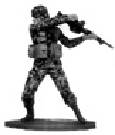|
|
||||
|
|
by Donald Levit  Feeling "powerful" learning how to shoot a military weapon at nineteen, Coco Schrijber wanted to find out how people come to their actual first killing of another human being. The result? A documentary titled, appropriately, First Kill, Schrijber’s disturbing contribution to ten "Dutch Treats: New Films from Holland." Working with a crew of three others -- fellow Europeans (sound and camera) and one Vietnamese -- the young filmmaker spent forty months probing this question, one that arose from her parents’ concentration camp experience and her own brief stay in Israel’s army. But from its early Lord-of-the-Flies pig’s head and a predator street falcon, the result goes much deeper than the title’s first blood, which is "not so hard." The focus is not, how does it start? but, rather, on the urge to continue killing, to amputate ears as gun-notch trophies ("took them away in Customs"), literally leave calling cards (always the ace of spades), torture women, machine-gun children and villages, dismember and skin, obliterate landscapes and livestock, "destroy all the Gooks." Interviews with ex-combatants are interspersed, not with combat footage, but photos of smiling, achingly young soldiers of that decade and shots of a quasi-modern Vietnam where an enterprising tourist trade offers up Cong tunnels, guided spiked booby traps, bomb craters for camcording, war-and-torture museums and AK-47 firing ranges. The effective core, however, involves interviews with haunted U.S. veterans who recount widely divergent reasons for going to the war. Whatever their original motivations or present situations, to a man they dismiss John Wayne, politics and esprit de corps. Simple survival instinct at first, and then atavistic reptile-part-of-the-brain blood lust are the forces that drove them, that became in essence what they are. Objectively non-political, the tale does not sensationalize carnage or wag an easy moral finger at any nation’s acts. One of the story’s two non-combatants, correspondent Michael Herr, author of Dispatches and screenwriter for Apocalypse Now and Full Metal Jacket, himself "a nice middle-class Jewish boy," haltingly attempts to articulate what the others, "semi-demi literate kids," visualize but cannot quite come to in words. But the writer cannot, either, though invoking Jung, Freud and a dangerous Collective Unconscious. Reluctantly acknowledging a strange beauty in it, and seeing associations with the war-beauty for which Apocalypse Now was criticized, Herr asserts that war is the "ultimate blood sport." Something there is, hidden, horrible and primordial, he muses, and high-salaried anchormen are incompetent if they, too, fail to comprehend battle and, by extension, the lure of blood that propels schoolkids to slaughter classmates, spectacularly. Pandering to a fascinated public, TV news prolonged, not shortened, our involvement in Southeast Asia. Only still photographer Eddie Adams is aloof from those events and their aftermath. Distinguished looking, he speaks a few times and, ironically, among the trappings of a fashion shoot, is given the coda. Made famous by that agonizing debacle’s most widely known photo – that precise moment of summary street execution recorded quite by accident, taken before his lunch, he shrugs, merely one death among many on any given day – he claims to have put it entirely behind him. "Pictures lie, with half-truths," he says, adding an expletive about no one caring. But he’s dead wrong, for his famous picture – shown half-a-dozen times throughout – this picture, do not lie. With her unobtrusively soft questions, Ms. Schrijber has an ability to make her subjects feel comfortable and open. They answer, pause, search memory, look within, and if none can express his soul, perhaps it’s because aspects of ourselves are so terrifying that Nature wisely refuses a clear view of them lest, with Conrad and Coppola's Kurtz, we lose humanity, turn clawed beasts and go mad. Without a distributor as yet, the director plans to carry First Kill to college campuses. Still, this is one film that needs to be seen everywhere, here and abroad. For we are, as Herr ruefully notes, capable of unbearable things. Facing our common demons may be the only way to exorcise and/or control those inner monsters. (Released by Lemming Film; not rated by MPAA.) |
||
|
© 2024 - ReelTalk Movie Reviews Website designed by Dot Pitch Studios, LLC |



